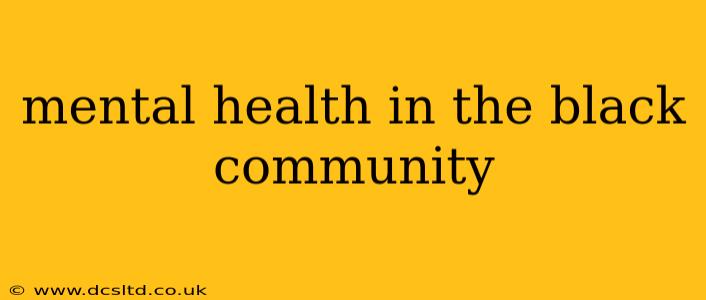Mental health is a critical aspect of overall well-being, and understanding its unique implications within the Black community is essential. For too long, systemic barriers, cultural stigma, and historical trauma have hindered access to adequate mental healthcare for Black individuals. This article delves into the multifaceted challenges and explores strategies for promoting mental well-being within the Black community.
Why is Mental Health a Particular Concern for Black People?
The mental health landscape for Black individuals is shaped by a complex interplay of factors. Historical trauma, stemming from slavery, Jim Crow laws, and ongoing systemic racism, leaves a lasting impact on mental well-being across generations. This trauma manifests in various ways, including higher rates of stress, anxiety, and depression. Furthermore, persistent discrimination in areas like housing, employment, and the justice system contributes to chronic stress and mental health challenges. These stressors disproportionately impact Black individuals, leading to disparities in mental health outcomes compared to other racial groups.
What are the Unique Barriers to Mental Healthcare Access in the Black Community?
Several significant hurdles prevent many Black individuals from seeking and receiving appropriate mental healthcare.
Lack of Access to Affordable and Culturally Competent Care:
Many Black communities lack access to affordable mental healthcare services. Even when services are available, finding providers who understand and are sensitive to the unique cultural experiences and perspectives of Black individuals is crucial. Culturally competent care is vital for building trust and fostering effective therapeutic relationships.
Stigma Surrounding Mental Illness:
Stigma remains a major barrier within the Black community, often stemming from cultural beliefs that equate mental illness with weakness or shame. This can prevent individuals from seeking help, even when they are struggling. Open conversations about mental health within families and communities are vital in dismantling this stigma.
Mistrust of the Healthcare System:
Historical and ongoing experiences of medical racism have fostered a deep mistrust of the healthcare system among many Black individuals. This mistrust can discourage seeking mental healthcare, even when needed. Building trust requires demonstrable commitment from healthcare providers to address these historical injustices and provide culturally sensitive care.
What are the Common Mental Health Issues Faced by Black Individuals?
While mental health issues affect people of all backgrounds, some conditions may be more prevalent or present differently within the Black community due to the aforementioned factors.
Post-Traumatic Stress Disorder (PTSD):
Given the historical and ongoing experiences of racism and discrimination, PTSD is a significant concern. The constant threat of racial bias and microaggressions can contribute to chronic stress and trauma.
Depression and Anxiety:
Rates of depression and anxiety are often higher among Black individuals, partly due to the chronic stress associated with systemic racism and social inequalities.
Substance Abuse:
Substance abuse can be a coping mechanism for dealing with the psychological distress resulting from systemic oppression and trauma.
How Can We Improve Mental Health Outcomes in the Black Community?
Addressing the mental health crisis in the Black community requires a multi-pronged approach.
Increasing Access to Culturally Competent Care:
Investing in culturally competent mental health services, including training healthcare providers on culturally sensitive approaches, is essential. Supporting and expanding community-based mental health programs that are specifically designed to serve the Black community can also be very beneficial.
Reducing Stigma Through Education and Awareness:
Public health campaigns and community initiatives focused on education and awareness can help reduce the stigma associated with mental illness within the Black community. Open conversations, community dialogues, and the sharing of personal stories can play a crucial role in normalizing mental health discussions.
Addressing Systemic Inequalities:
Ultimately, tackling systemic racism and social injustices that contribute to mental health disparities is paramount. Working towards equitable access to education, housing, employment, and other vital resources is crucial for improving the overall well-being of the Black community.
Promoting Self-Care and Resilience:
Encouraging self-care practices within the community, such as mindfulness, meditation, and healthy lifestyle choices, can build resilience and promote mental well-being.
Conclusion: A Path Towards Well-being
Improving mental health outcomes in the Black community demands a comprehensive and sustained commitment. By addressing systemic inequalities, increasing access to culturally competent care, reducing stigma, and promoting community-based support, we can create a more equitable and supportive environment where Black individuals can thrive mentally and emotionally. This is not just about providing services; it's about fostering a sense of belonging, empowerment, and hope.
